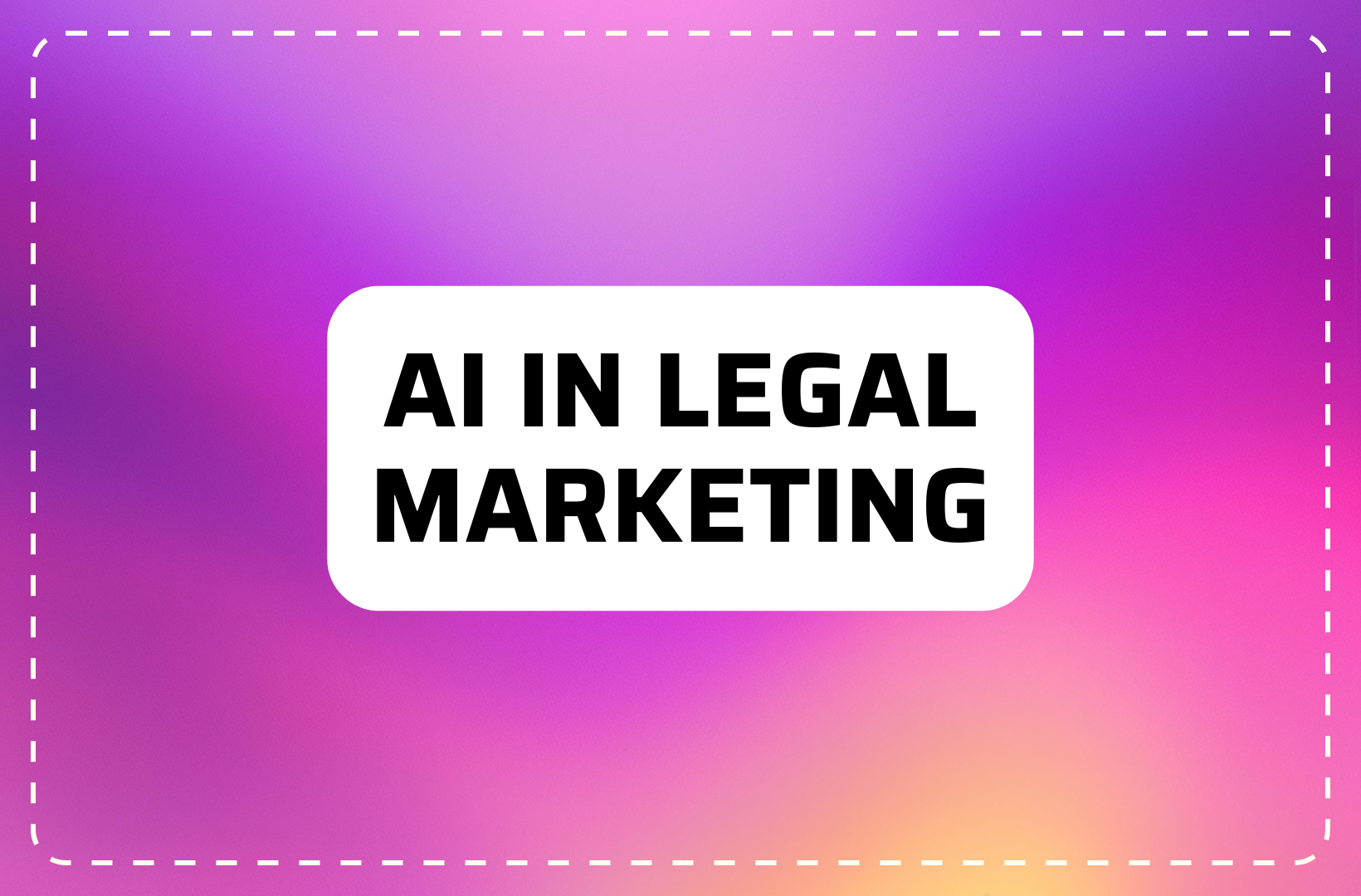Artificial intelligence is reshaping how businesses attract clients and scale their services. Law firms are no exception. Modern marketing now requires precision, personalization, and consistent engagement. AI makes these essential goals more achievable than ever before.
Recent surveys confirm this momentum. A 2025 American Bar Association survey showed that 31% of legal professionals now use generative AI at work. This marks an increase from 27% in 2023.

Larger firms with more than fifty lawyers reported adoption levels at 39%. Smaller firms, however, showed much slower adoption, with only about 20% using legal-specific AI tools. This widening adoption gap highlights how differently firms are approaching AI tools.
Early adopters gain efficiency, communication improvements, and stronger client connections. Others risk falling behind in competitive markets. Law firms embracing AI are positioning themselves for long-term growth and stronger advantages. In this article, we will explore how AI is transforming law firm marketing strategies today.
Build Smarter Client Connections with AI Tools
AI gives law firms new ways to understand and respond to client needs. Chatbots answer questions instantly, providing accessibility and reducing waiting times. Predictive tools analyze client behavior, helping firms foresee potential issues and act proactively. Together, these technologies make interactions more efficient and trustworthy.
The role of AI in improving productivity directly impacts client relationships. When lawyers save time on routine tasks, they can focus more on high-value tasks. This shift creates stronger connections because clients receive deeper analysis, more attention, and higher-quality communication from their attorneys. Trust naturally grows when efficiency is paired with expertise.
According to Harvard Law School, recent trials show just how much time AI can save in daily legal work. One pilot project tested a complaint response system used in high-volume litigation matters. The impact was remarkable, with drafting time reduced from 16 hours to only 3-4 minutes.
Productivity increased more than 100 times, allowing attorneys to spend their hours on strategy rather than information collection. Importantly, 90% of surveyed firms and clients agreed that this shift improves the quality of service. The outcomes highlight that AI enhances client service by freeing attorneys for deeper strategy. It also shows how greater productivity leads to a better quality of service.
Create Awareness-Focused Content that Resonates with Potential Clients
Law firms increasingly rely on awareness content to educate communities about their rights and legal responsibilities. AI tools streamline content creation by automatically producing topic suggestions, headlines, and organized draft structures.
Law firms can engage clients by producing blog posts covering a wide range of relevant topics. These can include accidents, personal injury claims, insurance disputes, workplace incidents, consumer rights, and traffic violations.
Accidents are an area where timely awareness content is especially important. Road accidents continue to rise across U.S. cities, with some areas experiencing higher risks than others. For example, Little Rock has seen a troubling number of serious accidents in recent years. Most recently, a three-vehicle crash in North Little Rock left one juvenile male dead and nine others injured.
The aftermath of these accidents is extremely challenging for victims, who often face complex legal procedures while trying to recover. They need clear guidance on how to navigate these situations and secure their rightful compensation. In such cases, law firms can create blog posts explaining how a Little Rock auto accident lawyer can assist victims through every step.
According to the Keith Law Group, these attorneys have extensive experience managing every part of auto accident cases. They assist clients in negotiating with insurance companies to secure appropriate compensation for medical bills, lost income, and vehicle damage. Additionally, they are prepared to represent clients in court if a fair settlement cannot be achieved.
Enhance Legal Marketing with AI Analytics and Insights
Law firms are increasingly leveraging AI-driven analytics to improve their marketing strategies and client outreach. By examining trends, engagement patterns, and case histories, firms can craft content that resonates more effectively with potential clients. AI tools help legal marketers identify high-value opportunities and optimize campaigns for measurable results.
The rising complexity of legal services has made traditional marketing approaches less efficient. Firms now require data-driven insights to understand client behavior, predict emerging legal needs, and refine messaging across multiple channels. With AI analytics, legal marketers can monitor performance in real time, enabling proactive adjustments that maximize engagement.
According to Mordor Intelligence, the global legal analytics market is projected to grow from approximately $3.15 billion in 2025 to $6.60 billion by 2030. This expansion reflects a compound annual growth rate of 15.92% over 2019-2030, highlighting the increasing adoption of AI-powered solutions by law firms worldwide. The numbers also indicate that adopting AI analytics in legal marketing has become crucial for driving measurable growth.
Drive Long-Term Growth through AI-Powered Strategies
Sustainable success requires law firms to focus on long-term planning rather than short-term wins. AI offers tools that help predict trends and identify areas where client interest is growing. Through careful data evaluation, law firms can make well-informed choices regarding priorities and resource management. This proactive planning enables them to foresee changes in the legal landscape.
AI also helps reduce operational inefficiencies by automating repetitive tasks. This allows teams to concentrate on high-level planning and strategy instead of manual workflows. Firms adopting AI can take a proactive approach to growth while improving client confidence and readiness for competitive markets. Additionally, AI-driven insights enable more effective prioritization of key projects and initiatives.
When integrated thoughtfully, AI tools support strategic decision-making and sustainable development. The result is a law practice that is both resilient and well-prepared for future challenges. Furthermore, firms can continuously refine strategies based on measurable outcomes and evolving client needs.
Frequently Asked Questions:
What makes AI effective for law firm marketing?
AI personalizes communication, automates repetitive work, and provides deep insights. These features allow firms to connect meaningfully with clients. By using advanced tools, law firms reach audiences more effectively. They also build credibility and demonstrate expertise. This creates trust, which is crucial for sustainable client growth.
How can AI improve content marketing for law firms?
AI helps generate blog topics, draft articles, and analyze audience preferences. These features help produce content more efficiently and with higher accuracy. Law firms can also use AI to optimize distribution. This ensures content reaches people when it matters most. Enhanced visibility builds trust and positions firms as reliable resources.
Is AI adoption expensive for small law firms?
Not necessarily. Many AI tools are subscription-based, making them affordable for smaller firms. Scalable pricing options allow firms to start small. Investment grows only when benefits become clear. Firms gain measurable returns through improved efficiency and stronger client engagement. The benefits over time far exceed the upfront costs.
How are AI tools influencing law firm strategies?
AI tools are reshaping law firm strategies by automating repetitive tasks, offering predictive insights, and personalizing client interactions. These capabilities allow firms to operate more efficiently and focus on delivering higher-value services. As legal practices adopt AI-based analytics, they refine their marketing and operational approaches for long-term growth.
Can startups apply similar AI strategies in their industries?
Absolutely! Startups can use AI-driven analytics to identify trends, predict user behaviors, and customize interactions. Just like law firms, startups benefit from automating administrative tasks, enhancing customer experiences, and leveraging data to drive decisions, making AI a universal game changer across industries.
What are the benefits of using AI for client communication?
AI improves client communication by employing chatbots for instant responses and predictive tools to foresee client needs. These tools enhance accessibility and build trust, mirroring the personalized service clients expect. Startups can use similar approaches to build stronger customer relationships and improve retention.
Which marketing areas in law firms are most impacted by AI?
AI is transforming content marketing, client targeting, and advertising strategies for law firms. By analyzing data, AI suggests optimal topics for blogs and the best channels and timings for distribution. This data-driven efficiency ensures higher engagement and ROI, a principle that startups can adapt to target their audiences strategically.
How can startups in legal tech collaborate with law firms?
Legal tech startups can partner with law firms by offering AI-integrated solutions that address their specific challenges, such as client management or content creation. These collaborations enable law practices to adopt technology seamlessly while startups gain credibility and market exposure.
Is the AI adoption gap a risk or an opportunity?
While the adoption gap between large and small law firms may seem like a risk, it also presents opportunities for growth. Startups providing scalable, affordable AI solutions can tap into the underpenetrated small-firm market. Those firms investing in AI early will gain a competitive edge, showcasing how industry gaps can drive innovation.
How does AI impact content creation for law firms?
AI enhances content creation by generating ideas, drafting content, and analyzing performance metrics. This efficiency allows firms to maintain regular high-quality output that resonates with clients. Startups trying to scale content quickly can use AI as a springboard for consistent messaging.
What futuristic trends are expected in legal marketing with AI?
Future legal marketing will likely incorporate even more advanced personalization, voice search optimization, and predictive content strategies made possible by AI. Startups in legal tech should monitor these trends to align their products with evolving market demands.
Are AI solutions scalable for small practices?
Yes. Many AI tools offer modular or subscription-based pricing, making them accessible to small businesses. For startups or lean teams in the legal space, AI offers scalability, ensuring that you can grow alongside your client base without incurring excessive upfront costs.
Why should startups keep an eye on AI's role in law firms?
The increasing use of AI in the legal industry shows the vast potential of automation, predictive analytics, and personalized marketing. Startups focusing on SaaS or AI solutions can gain insights into what makes these systems valuable, allowing them to create similar impact-driven tools for other industries.
AI is reshaping law firm marketing strategies by making them smarter, faster, and more personalized. Firms embracing these tools stand out in competitive markets. The results are clear. Awareness, analytics, and long-term planning, powered by AI, lead to measurable success. Law firms adopting AI today are building stronger, client-centered futures tomorrow.


